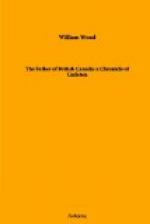The Walker affair was an instance of a bad case in which the law at last worked well. But there were many others in which it did not. What with the Coutume de Paris, which is still quoted in the province of Quebec; the other complexities of the old French law; the doubtful meanings drawn from the capitulation, the treaty, the proclamation, and the various ordinances; the instinctive opposition between the French Canadians and the English-speaking civilians; and, finally, what with the portents of subversive change that were already beginning to overshadow all America,—what with all this and more, Carleton found himself faced with a problem which no man could have solved to the satisfaction of every one concerned. Each side in a lawsuit took whatever amalgam of French and English codes was best for its own argument. But, generally speaking, the ingrained feeling of the French Canadians was against any change of their own laws that was not visibly and immediately beneficial to their own particular interests. Moreover, the use of the unknown English language, the worthlessness of the rapacious English-speaking magistrates, and the detested innovation of imprisonment for debt, all combined to make every part of English civil law hated simply because it happened to be English and not French. The home authorities were anxious to find some workable compromise. In 1767 Carleton exchanged several important dispatches with them; and in 1768 they sent out Maurice Morgan to study and report, after consultation with the chief justice and ’other well instructed persons.’ Morgan was an indefatigable and clear-sighted man who deserves to be gratefully remembered by both races; for he was a good friend both to the French Canadians before the Quebec Act and to the United Empire Loyalists just before their great migration, when he was Carleton’s secretary at New York. In 1769 the official correspondence entered the ‘secret and confidential’ stage with a dispatch from the home government to Carleton suggesting a House of Representatives to which, practically speaking, the towns would send Protestant members and the country districts Roman Catholics.
In 1770 Carleton sailed for England. He carried a good deal of hard-won experience with him, both on this point and on many others. He went home with a strong opinion not only against an assembly but against any immediate attempts at Anglicization in any form. The royal instructions that had accompanied his commission as ‘Captain-General and Governor-in-chief’ in 1768 contained directions for establishing the Church of England with a view to converting the whole population to its tenets later on. But no steps had been taken, and, needless to say, the French Canadians remained as Roman Catholic as ever.




